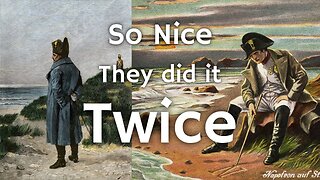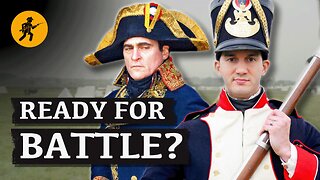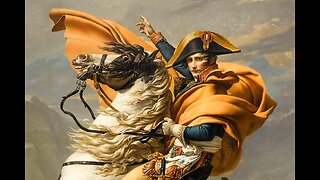Napoleon - who crowned himself Emperor (1769-1821)
Certainly, here's a more detailed account of Napoleon Bonaparte's life and career:
1. Early Life:
Born on August 15, 1769, in Ajaccio, Corsica, Napoleon came from a relatively modest noble family. He attended military school in mainland France and quickly rose through the ranks of the French military during the tumultuous years of the French Revolution.
2. Italian Campaigns:
In the 1790s, Napoleon gained prominence through successful military campaigns in Italy. The Battle of Lodi (1796) and the Siege of Mantua (1796-1797) showcased his tactical brilliance.
The Treaty of Campo Formio (1797) ended the War of the First Coalition and solidified Napoleon's reputation as a military genius.
3. Egyptian Campaign:
Seeking to expand French influence in the Middle East and undermine British interests, Napoleon led an expedition to Egypt in 1798. Despite initial successes, the campaign ended in failure.
4. Coup d'État and First Consul:
In 1799, discontent with the Directory's rule in France led to Napoleon's return. He orchestrated a coup d'état on November 9, 1799 (18 Brumaire in the French Revolutionary Calendar), and established the Consulate. Napoleon became the First Consul, effectively the ruler of France.
5. Napoleonic Code:
As First Consul, Napoleon implemented numerous domestic reforms. One of his most enduring contributions was the Napoleonic Code (Code Napoléon), a legal code that consolidated and modernized French law.
6. Emperor of the French:
In 1804, Napoleon crowned himself Emperor of the French, signaling the establishment of the First French Empire. This marked the end of the French Revolution's radical phase.
7. Military Campaigns - The Grande Armée:
Napoleon's military campaigns spanned much of Europe. The victories at Austerlitz (1805), Jena-Auerstedt (1806), and Wagram (1809) showcased his military prowess.
The Peninsular War (1808-1814) in Spain and the invasion of Russia in 1812, however, strained the resources of the Grande Armée and led to significant losses.
8. Downfall and First Exile:
The invasion of Russia proved disastrous. The Grande Armée suffered massive losses during the retreat from Moscow. In 1814, a coalition of European powers captured Paris, and Napoleon was forced to abdicate.
He was exiled to the island of Elba, off the coast of Italy, but he managed to escape and returned to France in 1815.
9. Hundred Days and Waterloo:
During the Hundred Days, Napoleon briefly resumed power in 1815. However, his defeat at the Battle of Waterloo on June 18, 1815, against the British and Prussian forces, marked the end of his rule.
10. Second Exile and Death:
Napoleon abdicated for the second time and was exiled to the remote island of Saint Helena in the South Atlantic. There, he lived in exile until his death.
Napoleon Bonaparte died on May 5, 1821, possibly due to stomach cancer. His body was later repatriated to France in 1840, and he was buried in Les Invalides in Paris.
Napoleon's legacy is complex and multifaceted. He is remembered for his military brilliance, administrative reforms, and the Napoleonic Code, but also for the wars he waged and the profound impact he had on European history during the Napoleonic era.
-
 4:31
4:31
100 Historical Figures
3 months agoNapoleon - who crowned himself Emperor (1769-1821)
55 -
 1:31
1:31
Relaxed History
6 months agoWhy was Napoleon exiled and not executed?
50 -
 57:22
57:22
CAPT JAKE's Sim Racing, and Gaming
4 months agoEPISODE 1 - Total War - Napoleon - 1792 Campaign - Prussians - Part 2 of 2
22 -
 51:50
51:50
CAPT JAKE's Sim Racing, and Gaming
4 months agoEPISODE 1 - Total War - Napoleon - 1792 Campaign - Prussians - Part 1 of 2
39 -
 45:26
45:26
Survive History
2 months ago $33.24 earnedCould You Survive as a Soldier of Napoleon?
107K18 -
 1:11:13
1:11:13
CAPT JAKE's Sim Racing, and Gaming
3 months agoEPISODE 3 - Total War - Napoleon - 1792 Campaign - Prussians - Jun - Sept 1792
35 -
 14:56
14:56
Forgotten History Channel
1 month ago $0.08 earnedTRUTH about Napoleon Bonaparte - Part I - Forgotten History
5294 -
 48:32
48:32
CAPT JAKE's Sim Racing, and Gaming
1 month agoEPISODE 2 - Total War - Napoleon - 1796 Italian Campaign - Final
37 -
 1:21:17
1:21:17
CAPT JAKE's Sim Racing, and Gaming
3 months agoEPISODE 5 - Total War - Napoleon - 1792 Campaign - Prussians - Jan 1793 - May 1793
33 -
 51:47
51:47
CAPT JAKE's Sim Racing, and Gaming
2 months agoEPISODE 6 - Total War - Napoleon - 1792 Campaign - Prussians - May 1793 - July 1793
30